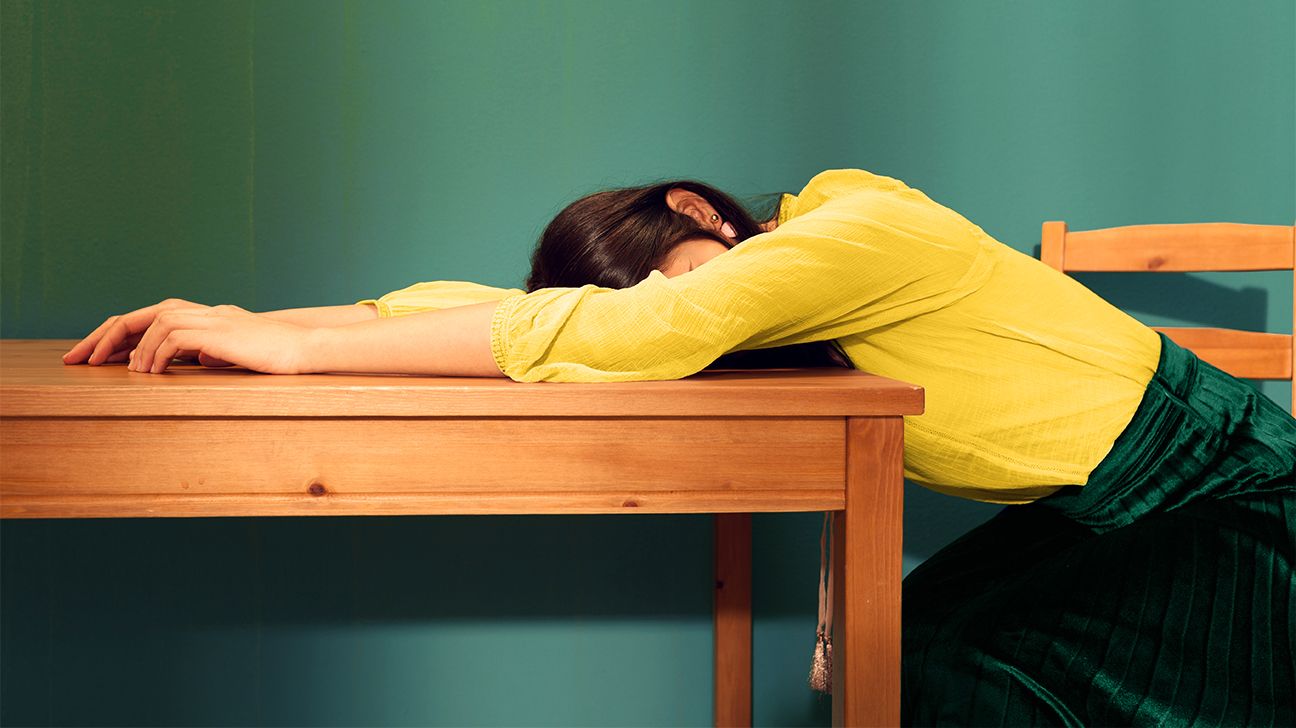You know the feeling well: It’s hard to get out of bed, you’re overwhelmed by the smallest tasks, and feel kinda meh about everything. Some days, that’s just how it goes.
But if that kind of scenario is playing out for you on the reg, you may actually be experiencing emotional exhaustion — and you’re not alone.
There are, unfortunately, lots of reasons you may be emotionally exhausted, but on the bright side, there are also plenty of strategies you can use to help yourself feel better.
Emotional exhaustion is definitely more likely to happen when you go through a period of high or unusual stress (hello 2020) — but really, it’s more than feeling a wee bit overstretched.
Emotional exhaustion is more akin to feeling like. You. Just. Can’t. Anymore. Unchecked, it can lead to burnout, which itself has been linked to a weakened immune system and poorer cardiovascular health.
Signs you’re emotionally exhausted
If you’re emotionally exhausted as a result of unrelenting stress, it’s likely that your major stress hormones (adrenaline and cortisol) are kicking into high gear much of the time.
And while those stress hormones are helpful in moments of major distress (think “fight, flight, or freeze”), if your body never gets a real break, you’ll find yourself in a constant stress loop that will probably interfere with your immunity, sleep, and metabolism.
With emotional exhaustion, you may have physical symptoms like:
- feeling tired (alllll the time)
- headaches
- tummy troubles
- rapid heartbeat
- weight and appetite changes (up or down)
- sleeplessness or frequent oversleeping
You could also have mental and emotional symptoms, like:
- feeling overwhelmed, stuck, helpless, or hopelessness
- irrita-freaking-bility
- diminished sense of joy and pleasure
- feeling like your glass is always half-empty
- depression and/or anxiety
- trouble focusing at work or school
- brain fog and forgetfulness
- turning to alcohol, cannabis, prescriptions, or even screens more often than you’d like
- dwelling on fantasies (like winning the lottery) to escape everyday life
- isolating yourself from friends and loved ones
Experiencing exhaustion and depression?
If emotional exhaustion shows up alongside severe depression, or if you find yourself feeling isolated and alone, do seek help. Call the National Suicide Prevention Lifeline at 1-800-273-TALK (8255), or use the Crisis Text Line at 741741.
There are lots of reasons you may be feeling emotionally exhausted, and living through the COVID-19 pandemic has an effect on — umm, let’s think — pretty much all of them.
For example, if you’re suddenly dealing with a colossal workload, or — on the flip side — if you’re unemployed or underemployed, that can contribute to feeling emotionally drained.
And if you’re financially stressed, uncertain about the future of your job, or simply feeling the strain of endless video conferencing, those, too, can add up quickly.
On the relationship front, the biggies like break-ups or divorce, the death of a loved one (pets included), caregiving for someone who’s sick, or having a baby can all be contributors.
But even lesser relationship stressors — like doing most of the emotional labor in a romantic partnership — can help edge you toward exhaustion territory.
And then there’s the cumulative stresses of living. If you’re feeling powerless over your life situation, lacking in work-life balance, or just stretched too thin overall, that’s also a recipe for emotional exhaustion.
The first step to combating emotional exhaustion is being aware that it’s happening in the first place.
Strategies for dealing with emotional exhaustion include:
- Just say no to what’s draining you. Keep doing all that’s necessary and all that gives you joy; drop whatever you’re making yourself do just because other people expect it.
- Whenever possible, limit your exposure to the things that stress you out the most. We’re looking at you, news alerts and social media feeds.
- Drink at least 64 ounces of water daily and eat a balanced diet. Get back to basics — we’re talking lots of vegetables, fruits, and healthy fats and proteins.
- Avoid heavy use of caffeine and other stimulants. Ahem, 3 p.m. double espresso? Especially if anxiety and sleeplessness come as part of your emotional exhaustion package.
- Get 7 to 9 hours of sleep each night. Practice good sleep hygiene by turning off devices at least 1 hour before bed.
- Do nothing. In other words, try incorporating meditation or mindfulness into your routine.
- Mix in some fun with your exercise. Make exercise a “get to-do” not a “have to-do.” In other words, move your body in whatever way feels good because it feels good (not because you’re trying to fit a certain pair of jeans).
- Go outside. Soak up that vitamin D, and let nature soothe you.
- Express yourselfby pursuing a creative or crafty outlet. Try painting, knitting, pickling, or writing haiku — it doesn’t matter what you do as long as it feels like a break from your usual responsibilities.
- Seek support. Take a walk and call a friend or talk to a good therapist (or both!).
If your emotional exhaustion comes with depressive or anxious symptoms, your doctor may prescribe an antidepressant like an SSRI or an SNRI (some of which can treat both depression and anxiety).
Emotional exhaustion is totally common, but also totally reversible. Reflecting on how you spend your time and prioritizing your mind-body health can help you kick emotional exhaustion to the curb and get your oomph back.
tl;dr
- Emotional exhaustion — while fairly common in normal times — is likely on the rise during the COVID-19 pandemic.
- Left unaddressed, emotional exhaustion can lead to burnout.
- Accumulated stresses from work, relationships, and life in general all contribute to emotional fatigue.
- To help yourself, practice saying no to what doesn’t serve you and embracing self-care.
- If your symptoms of emotional exhaustion are hard to handle on your own, talk to your doctor or therapist.


